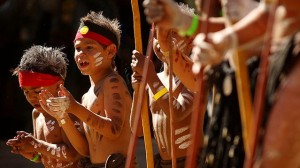Home » Commentary » Opinion » Building Indigenous competitive advantage
· THE SPECTATOR - FLAT WHITE

 The ABC’s recent Alice Springs Q&A highlighted many key features of the Indigenous disadvantage debate — both positive and negative. While issues such as juvenile detention and domestic violence dominated, the discussion also raised the economic plight of remote Indigenous communities.
The ABC’s recent Alice Springs Q&A highlighted many key features of the Indigenous disadvantage debate — both positive and negative. While issues such as juvenile detention and domestic violence dominated, the discussion also raised the economic plight of remote Indigenous communities.
Audience members asked about reducing airfares to make towns more attractive, and panellists re-iterated the need to give Indigenous youth employment skills to foster economic growth. These issues, and the ineffective calls for more government intervention, reflect a more engrained problem.
However, the causes of economic disadvantage are what we really need to address. In many remote communities there is a complete lack of a functioning economy.
Developing employment skills is great, but without businesses for people to work in there will be no real pathway out of poverty for disadvantaged Indigenous Australians.
Promoting Indigenous enterprise is one solution to this dilemma, but in remote central Australia there are many impediments to business
First, intergenerational welfare dependency has sapped initiative in some communities. There is little incentive to break out of this cycle, and no one to turn to for capital or even business advice.
Further, low education outcomes exacerbate the situation, with a lack of basic literacy and numeracy skills standing as barriers to starting a business.
And complex communal land ownership laws and cultural understandings of wealth are also a deterrent. Q&A panellist (and Centre for Independent Studies research associate) Jacinta Price acknowledged as much when she outlined that the monetary demands from family make it challenging for individuals trying to break into the economy.
Geographic remoteness represents yet another obstacle. The costs of travel and the lack of consumers and business partners significantly restrict the ability of remote indigenous Australians to interact with the market and develop businesses.
The government response is the Indigenous Procurement Policy (IPP); which sets a target for 3% of all procurement spend to go to Indigenous businesses. Indigenous suppliers tender in competition with other businesses on a value for money basis, with $284 million worth of contracts awarded in the first year of the policy.
Specific targets for remote areas form a key part of the IPP, but, in reality the nature of government procurement means the policy can only have a restricted impact. Government procurement contracts are specialised and limited in their scope. The majority of work goes to a limited number of industries and is primarily carried out in our capital cities.
Even if there was a substantial amount of work to be undertaken in remote areas, it does not mean the IPP alone can generate sustainable economic development. At best, it would foster a false economy dependent on government procurement for its survival.
Instead, businesses in regional and remote Indigenous communities should focus on their potential strengths. One such competitive advantage for Indigenous Australians is their culture.
There is significant demand from tourists for genuine Indigenous cultural experiences. Recent research by Tourism WA found one in five visitors took part in an Indigenous cultural activity. However, 75% said they were interested in engaging with Aboriginal culture but believed experiences were hard to find and often of limited quality.
As Q&A panellist Dale McIver observed, tourism is a big economic driver for regional and remote towns.
Remote Indigenous communities have a unique opportunity to capture this market. Cultural businesses can encourage tourists to visit some of our most disadvantaged townships, creating demand for supporting industries and the local economy.
Successful examples of cultural tourism businesses already exist across Australia. There is no shortage of attempts to solve problems in remote communities. However, we need to look at some solutions that will play to potential strengths of Indigenous Australians — solutions that will bring a truly competitive advantage.
Charles Jacobs is a Policy Analyst in the Centre for Independent Studies Indigenous Prosperity Project.
Building Indigenous competitive advantage